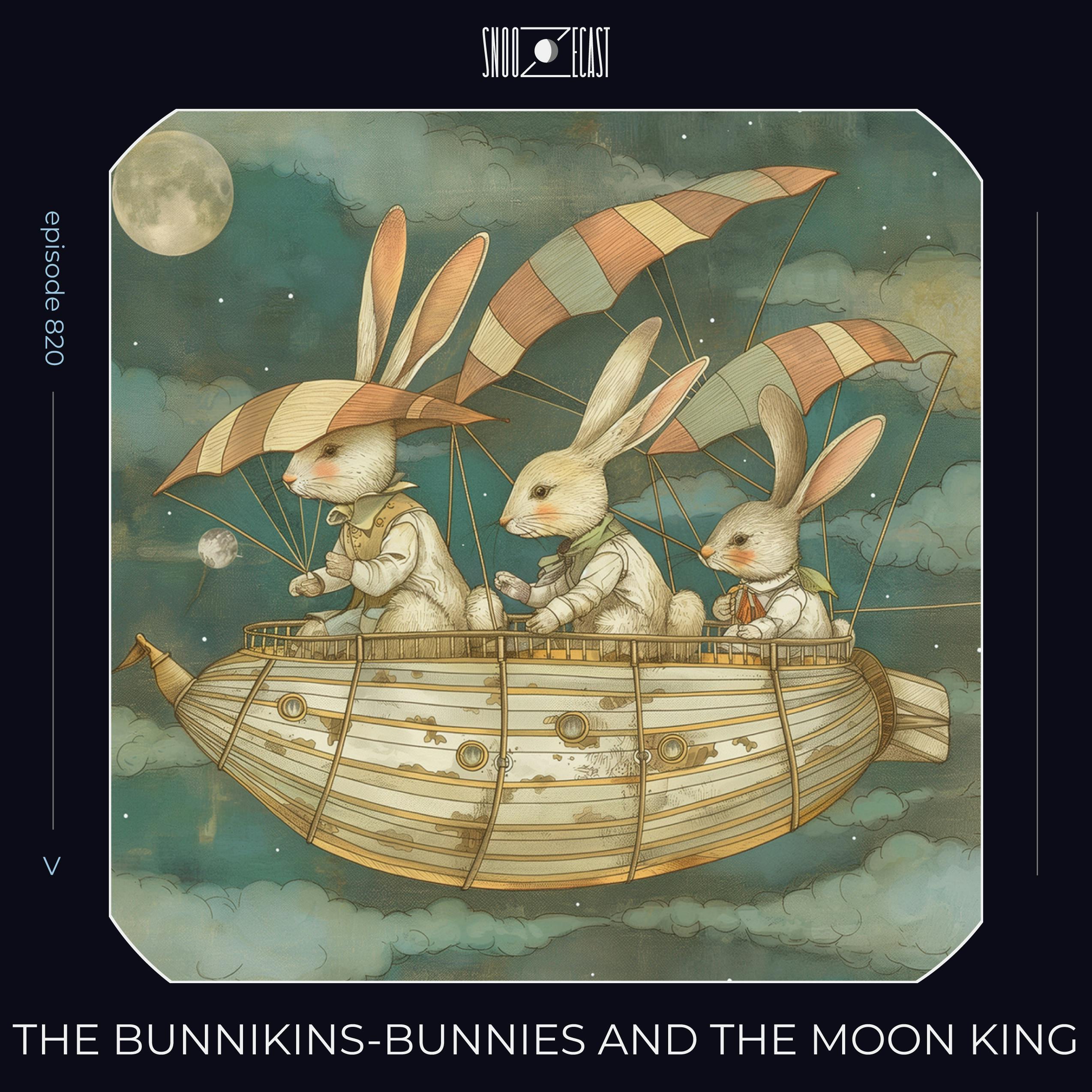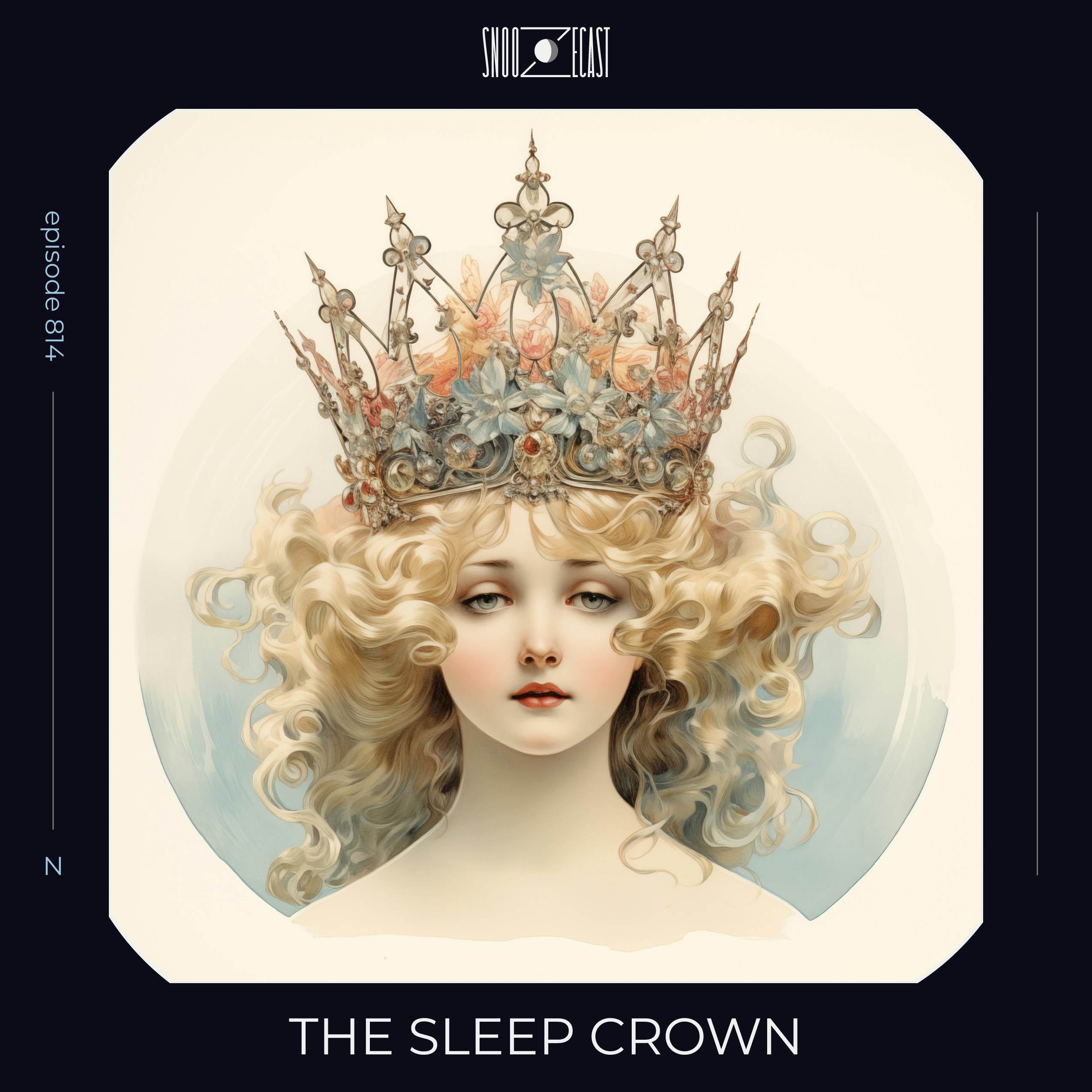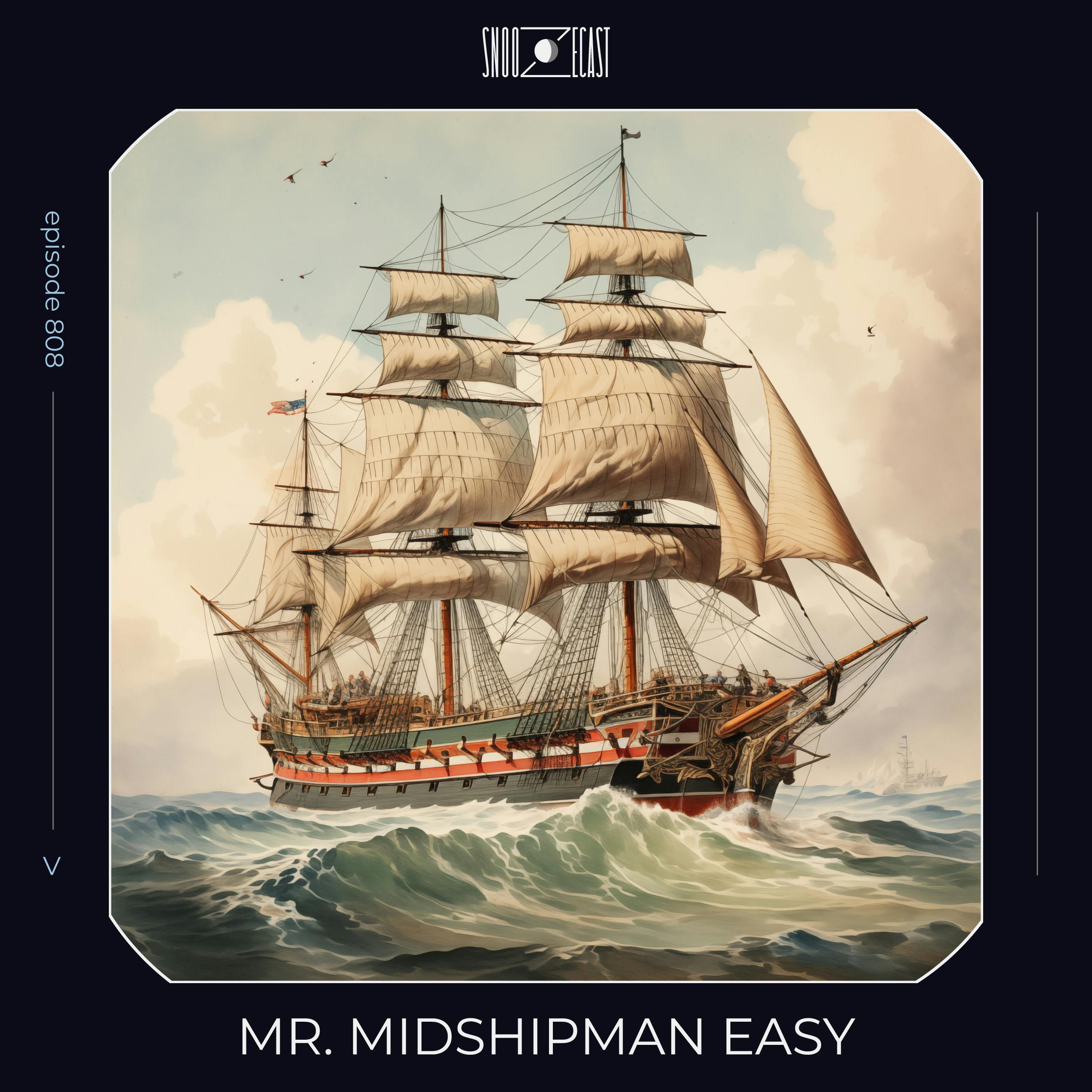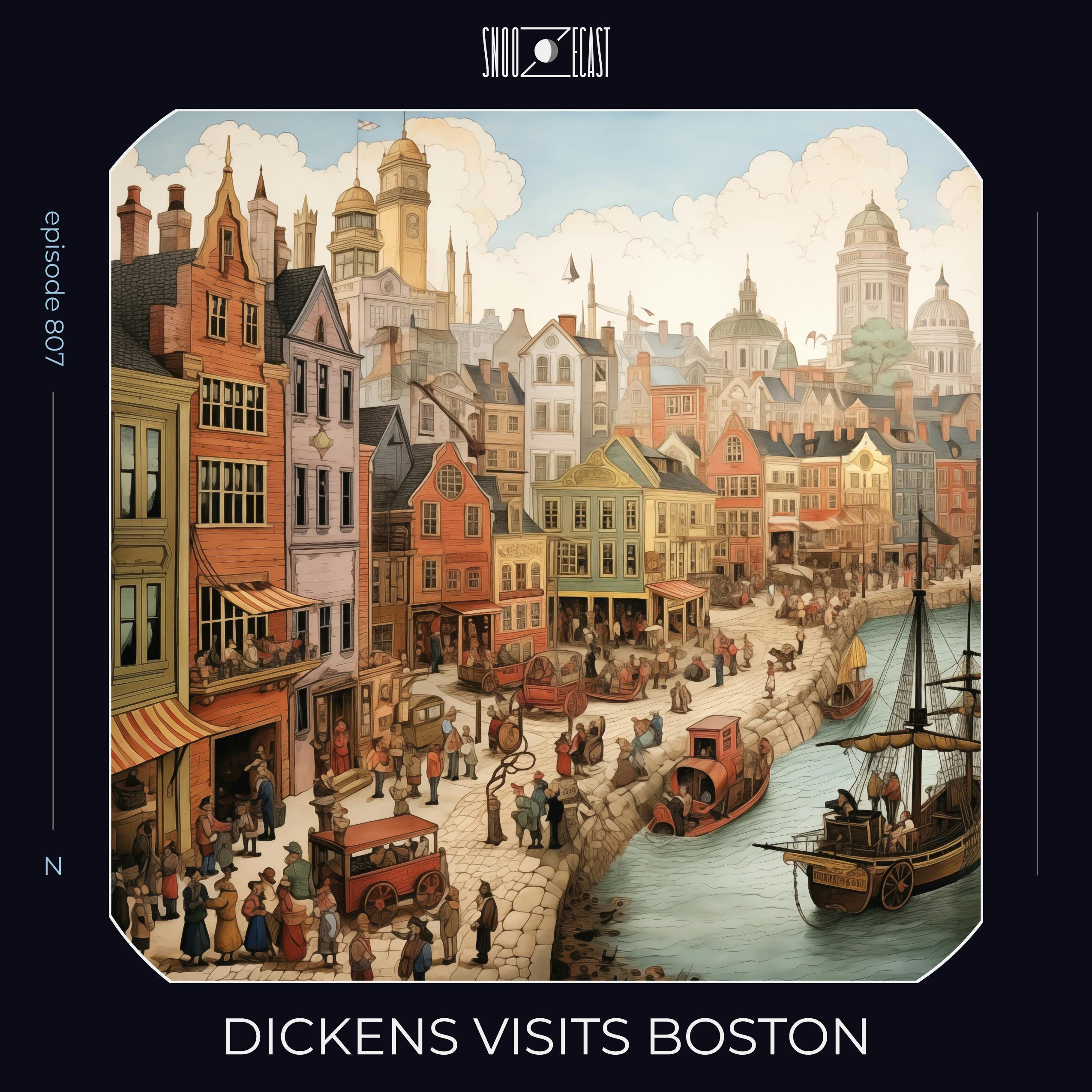835 episodes


Tonight, we’ll read “Nibbles Poppelty-Poppett, The Story of a Mouse” written by Edith B. Davidson and published in 1911. In this story, Nibbles the mouse sets out to seek his fortune. Along the way, he encounters a peculiar inn run by guinea pigs, where he struggles to find food until he meets a sleepy but hospitable Salamander. After a hearty meal, the Salamander shares his love for coziness and poetry with Nibbles. If you enjoy this sort of story, be sure to find the other recent Snoozecast episode by this author, titled “The Bunnikins-Bunnies and the Moon-King”. — read by 'V' — Sign up for Snoozecast+ to get expanded, ad-free access by going to snoozecast.com/plus! Learn more about your ad choices. Visit megaphone.fm/adchoices


Tonight, we’ll read the next part to “Twenty Thousand Leagues Under the Sea,” a classic science fiction adventure novel by French writer Jules Verne. In the last episode, the Nautilus passes through the Sargasso Sea, an underwater lake where currents meet, filled with aquatic plants. During this time, Aronnax wonders if Nemo will ever release them. He sees little of Nemo, and they spend much of their time on the surface. — read by 'N' — Sign up for Snoozecast+ to get expanded, ad-free access by going to snoozecast.com/plus! Learn more about your ad choices. Visit megaphone.fm/adchoices


Tonight, we’ll read the opening to “The House of Mirth,” a 1905 novel by American author Edith Wharton. Snoozecast first aired this story in 2021. It tells the story of Lily Bart, a beautiful but impoverished New York City socialite. The commercial and critical success of “The House of Mirth” solidified Wharton's reputation as a major novelist. The central theme of “The House of Mirth” is essentially the struggle between who we are and what society tells us we should be. Thus, it is considered by many to be as relevant today as it was in 1905. — read by 'N' — Sign up for Snoozecast+ to get expanded, ad-free access by going to snoozecast.com/plus! Learn more about your ad choices. Visit megaphone.fm/adchoices


Tonight, we’ll read a Snoozecast original about two sisters who experience the eclipse of 1918 as it passed over their part of Kansas. In a quiet prairie town, Alice and Pearl find themselves caught in the path of a total solar eclipse. Together, they lay on a quilt in the farm field as day turns momentarily to night. In this story, set in the year 1918, the sisters used “smoked glass” as a prudent way to protect the eyes to view the eclipsing of the sun as the moon moves over it. Now, we know that smoked glass is unfortunately not sufficient protection, and recommend eclipse watchers to wear specialized solar glasses. Smoked glass was invented during the first telescopic viewing of a total solar eclipse by King Louis XIV of France. This method remained popular through the early 19th century, but by 1932 smoked glass started to fall out of favor. Either way, if you are in the path of totality, you do not need to use protection during the brief period of time when the sun is completely covered by the moon, referred to as “the totality.” — read by 'N' — Sign up for Snoozecast+ to get expanded, ad-free access by going to snoozecast.com/plus! Learn more about your ad choices. Visit megaphone.fm/adchoices


Tonight, we’ll read the fourteenth chapter to “Anne of Green Gables” the classic 1908 novel by Lucy Maud Montgomery. This chapter is titled “Anne’s Confession”. In the last episode, titled “The Delights of Anticipation,” Anne excitedly shares with Marilla her plans for a Sunday school picnic. Eager for her first taste of ice cream, Anne persuades Marilla to let her attend, who agrees to prepare a basket of food. Despite Marilla's attempt to temper Anne's excitement, Anne insists on embracing anticipation rather than heeding advice from conservative figures like Mrs. Rachel. She also admires Marilla's amethyst brooch, her most treasured possession, and requests to hold it briefly. — read by 'N' — Sign up for Snoozecast+ to get expanded, ad-free access by going to snoozecast.com/plus! Learn more about your ad choices. Visit megaphone.fm/adchoices


Tonight, in our special monthly Snoozecast+ Deluxe bonus episode, we invite you to immerse yourself in a tale crafted by Snoozecast, drawing inspiration from an ancient Chinese Taoist parable. If you would like to learn more about what our premium subscriptions offer, go to snoozecast.com/plus. Our story centers on a farmer who embodies the Taoist principle of withholding judgment towards the events unfolding in his life. He understands that labeling occurrences as either good or bad fortune is futile, recognizing the inherent uncertainty of life. This timeless parable gained traction in the West largely due to the efforts of the self-styled "philosophical entertainer," Alan Watts. Renowned for his interpretations and popularizations of Buddhist, Taoist, and Hindu philosophies, Watts played a significant role in bridging Eastern thought with Western audiences. His lectures continue to resonate even after his passing, finding renewed popularity through regular broadcasts on public radio and more recently, on the internet. The majority of his recorded talks date back to the vibrant cultural landscape of the 1960s and early 1970s. Learn more about your ad choices. Visit megaphone.fm/adchoices


Tonight, we’ll read the fairy tale “The Golden Mermaid” from the “Green Fairy Book”. In this story, three princes are sent on a quest by their father, to find who it is who steals the golden apples from the King's tree. The youngest son befriends a wolf who is in reality a magician. With the aid of the wolf, the prince sets out to attempt an impossible task. Snoozecast first aired this story back in March of 2020. Jacob and Wilhelm Grimm were German academics, linguists, and folklorists. Their legacy is enshrined in their monumental work, "Grimm's Fairy Tales," which comprises folk stories collected from oral traditions across Germany and Europe. Despite facing adversity in their early lives, they dedicated themselves to scholarship and preserving cultural heritage. Their profound impact on literature transcends generations and borders. Through meticulous research and dedication, they compiled and edited tales that continue to enchant and inspire readers worldwide. Learn more about your ad choices. Visit megaphone.fm/adchoices


Tonight, we’ll read from the opening to “History of Charles XII” written by French writer and philosopher Voltaire. It was first published in 1731. In this first major historical biography from the author, Voltaire tells the story of a warrior king who was the embodiment of the archetypal ‘hero’. Voltaire’s Charles was a leader both admirably strong and unabashedly tyrannical. Charles XII, also known as Carl XII or Carolus Rex, was the king of Sweden and what is now Finland. Charles assumed power at the age of 15. His reign lasted for about 20 years, ending in the year 1718. Learn more about your ad choices. Visit megaphone.fm/adchoices


Tonight, we’ll read the fourth chapter to “Good Wives” written by Louisa May Alcott. This is also known as the second half of the “Little Women” novel. Originally, Alcott had it published as a second book but in later publishings the two were combined. Our last episode was the chapter titled “Artistic Attempts” In it, Amy grows serious in her undertaking to become a real artist. Aunt March has enrolled her in a drawing class, and as a result she experiments with many methods as the results collect around the house. Amy then invites her drawing class for lunch. Determined to provide a proper meal, she promises to cover expenses. Despite initial support from her mother, Jo finds the plan frivolous. Preparation proves challenging: costs soar, and the weather dampens spirits. None of the guests show up, leaving the family to salvage what they can of the meal. Hope lingers for the next day, but with no provisions at home, Amy ventures out for a lobster. She manages to persuade one guest to join, salvaging the occasion. Though embarrassed, the family accommodates the unexpected guest. Amy and her friend enjoy a pleasant day together, despite the setbacks. Learn more about your ad choices. Visit megaphone.fm/adchoices


Tonight, we’ll read excerpts from “Candy-Making Revolutionized: Confectionary from Vegetables” by Mary Elizabeth Hall, printed in 1912. Long-time listeners may recall that this episode first aired back in 2020. Confectionery is the art of making confections, which are food items that are rich in sugar and carbohydrates. It can be divided into two broad categories: bakers' confections and sugar confections. Before sugar was readily available in the ancient western world, confectionery was based on honey. Honey was used in ancient civilizations to preserve perishable and delicate fruits and flowers. The ancient Persians, followed by the Greeks, made contact with the Indian subcontinent and spread sugar agriculture from what was thought of as the native Indian "reeds that produce honey without bees". Generally, confections are low in micronutrients and protein but high in calories. Many confections are considered empty calories and ultra-processed foods. Hall wrote that her hope was that through this book “ the more vegetable candy is made, the less unhealthful confectionery there will be consumed. — read by 'V' — Sign up for Snoozecast+ to get expanded, ad-free access by going to snoozecast.com/plus! Learn more about your ad choices. Visit megaphone.fm/adchoices


Tonight, we’ll read the opening to “The Wishing Well” written by Mildred A. Wirt and published in 1942. In this story, an old abandoned estate is the location of a wishing well known for actually granting wishes. Penny investigates and discovers not only the secret of the well, but also a valuable treasure. If you enjoy this episode, be sure to check out our other Penny Parker series episodes by searching for our show titled “Snoozecast Presents: Penny Parker” wherever you listen to Snoozecast. Or, you can find Penny at snoozecast.com/series. — read by 'V' — Sign up for Snoozecast+ to get expanded, ad-free access by going to snoozecast.com/plus! Learn more about your ad choices. Visit megaphone.fm/adchoices


Tonight, we shall read the next part to “Persuasion”, the last novel fully completed by Jane Austen, and published in 1817. The story concerns Anne Elliot, a twenty-seven year old Englishwoman, whose family moves in order to lower their expenses and reduce their debt, by renting their home to an Admiral and his wife. In the last episode, Mr. Shepard and Lady Russell draw up a plan for Sir Elliot to get out of debt. They decide that he must "retrench" by seriously cutting back on his expenditures, which the gentleman refuses to do. They then suggest that Sir Elliot move out of his home in order to rent it out. The plan is agreed to by Sir Elliot, with his stipulations that it not seem like he is renting it for cost-savings but rather as a favor to the renter. It is further agreed to that during this time they will stay in the city of Bath, which has a lower cost of living and where their more limited budget will go farther. We will start back in with an abbreviated opening to chapter 3, where Sir Elliot is discussing the matter further with the group. — read by 'V' — Sign up for Snoozecast+ to get expanded, ad-free access by going to snoozecast.com/plus! Learn more about your ad choices. Visit megaphone.fm/adchoices


Tonight, we’ll read "The Wild", sometimes known as “Walking”, a lecture by Henry David Thoreau first delivered in 1851. It is a transcendental essay that analyzes the relationship between man and nature, trying to find a balance between society and our raw animal nature. Thoreau read the piece a total of ten times, more than any other of his lectures. This episode first aired back in 2021. — read by 'N' — Sign up for Snoozecast+ to get expanded, ad-free access by going to snoozecast.com/plus! Learn more about your ad choices. Visit megaphone.fm/adchoices


Tonight, we’ll read the story titled “The Bunnikins-Bunnies and the Moon King” written by Edith B. Davidson, and published in 1912. In this early science-fiction story geared towards children, the Bunnikin-Bunnies go on a family vacation to the Moon, via the Milky Way. While traveling to the moon was not possible when this book was published in 1912, scientists were diligently laying down groundwork for the future accomplishments. In 1903, a Russian study showed that physical space exploration was theoretically possible using rockets. And by the end of the 1910s, an influential paper from the US discussed reaching extreme altitudes through rocketry. As for the Bunnikins-Bunnies, you will soon learn that their means of transportation was not on a rocketship, but on a vehicle that looked much like a fishing boat, but with large wings. — read by 'V' — Sign up for Snoozecast+ to get expanded, ad-free access by going to snoozecast.com/plus! Learn more about your ad choices. Visit megaphone.fm/adchoices


Tonight, we’ll read the next part to “Twenty Thousand Leagues Under the Sea,” a classic science fiction adventure novel by French writer Jules Verne. Have you ever wished that a continuing Snoozecast story was easily available as a playlist so you could either start from the beginning, or play multiple episodes from just that story in a row, so that you don’t need to go searching through the catalog? In case you didn’t know, we also produce standalone versions of these stories as its own separate Snoozecast podcasts, for easy listening. Just search for “Snoozecast Presents” to find all the options available. And if you subscribe to Snoozecast+, you get complete access to all these series, ad-free. To learn more, go to snoozecast.com/plus . In the last episode, the captives aboard the Nautilus awaken one day to learn that they are now underground, inside an extinct volcano. The cave is used by Nemo as a place of refuge, where he sources the elements needed to produce the electricity that makes the Nautilus run. While Nemo spends the day loading up the reserve stock of sodium they keep down there, Arronax, Conseil, and Ned explore the volcanic island. They forage for food including a beehive full of honey, before returning the ship. — read by 'N' — Sign up for Snoozecast+ to get expanded, ad-free access by going to snoozecast.com/plus! Learn more about your ad choices. Visit megaphone.fm/adchoices


Tonight, we’ll read the opening section from FROM THE CAVES AND JUNGLES OF HINDOSTAN, written by Helen Blavatsky and published in 1883. This episode first aired in January of 2020. Madame Blavatsky was a Russian occultist and philosopher who traveled around the world, including India, before moving to New York City. She co-founded the Theosophical Society in 1875 and gained an international following from the esoteric religion that the society promoted. Madame Blavatsky was a controversial figure, championed by supporters as an enlightened guru and derided as a fraudulent charlatan by critics. Her Theosophical doctrines influenced the spread of Hindu and Buddhist ideas in the West as well as the development of Western esoteric currents like the New Age Movement. — read by 'V' — Sign up for Snoozecast+ to get expanded, ad-free access by going to snoozecast.com/plus! Learn more about your ad choices. Visit megaphone.fm/adchoices


Tonight, for our final selection in our “Woodcraft” series, we will read selections of the author’s poetry, published as “Forest Runes” by George Washington Sears and published in 1887. Sears was a writer and adventurer who penned essays on hunting, fishing, and camping for popular journals and magazines. Runic alphabets are native to the ancient Germanic peoples, before they adopted the Latin alphabet. The earliest runic inscriptions found on artifacts give the name of either the craftsman or the proprietor, or sometimes, remain a linguistic mystery. Due to this, it is possible that the early runes were not used so much as a simple writing system, but rather as magical signs to be used for charms. Although some say the runes were used for divination, there is no direct evidence to suggest they were ever used in this way. The name rune itself, taken to mean "secret, something hidden", seems to indicate that knowledge of the runes was originally considered esoteric, or restricted to an elite. The Bluetooth logo is the combination of two runes that are the initials of Harald “Bluetooth” Gormsson's who was a king of Denmark from the Viking Age. — read by 'N' — Sign up for Snoozecast+ to get expanded, ad-free access by going to snoozecast.com/plus! Learn more about your ad choices. Visit megaphone.fm/adchoices


Tonight, we’ll read the thirteenth chapter to “Anne of Green Gables” the classic 1908 novel by Lucy Maud Montgomery. This chapter is titled “The Delights of Anticipation”. In the last episode, titled “A Solemn Vow and a Promise,” Marilla is dismayed to hear about the wildflowers on Anne's Sunday school hat, and of course she lectures Anne about them. Though Anne points out many girls at church had bouquets pinned to their dresses—and many had artificial flowers on their hats—Marilla is worried about the bad impression Anne must have made. Marilla may have been more anxious than usual because she is about to bring Anne with her to meet Diana Barry, who lives close by and is Anne's age. As she has done in the past, she warns Anne of the importance of impressing Diana's strict mother. Out in the garden the two girls stare bashfully at each other until Anne breaks the silence by asking, "Do you think you can like me a little—enough to be my bosom friend?" It's an odd and startling question for someone Anne has just met, but Diana laughs and agrees. Diana says in response that, "I heard before that you were queer. But I believe I'm going to like you real well." — read by 'N' — Sign up for Snoozecast+ to get expanded, ad-free access by going to snoozecast.com/plus! Learn more about your ad choices. Visit megaphone.fm/adchoices


Tonight, we’ll read the second half to “The Princess of Babylon”, found in the The Strange Storybook by Mrs. Lang, published in 1913. The first half aired last week. This story first aired way back in 2020. The story is taken from a lesser known philosophical tale by Voltaire, written in 1768. Voltaire was a French Enlightenment writer, philosopher, satirist, and historian. Famous for his wit and social critiques, he was an advocate of freedom of speech, freedom of religion, and separation of church and state. In the first episode, the king holds a competition of the world’s rulers who were interested in marrying his daughter, the princess. The games would be impossibly difficult. A handsome and magical stranger appears out of seeming thin air to win the games, however he is suddenly called away to care to matters at home. — read by 'V' — Sign up for Snoozecast+ to get expanded, ad-free access by going to snoozecast.com/plus! Learn more about your ad choices. Visit megaphone.fm/adchoices


Tonight, we’ll read a Snoozecast original story about a family who is visited by the fairy Luminastra Slumbornia, who gives the gift of peaceful sleep. Like Luminastra, all fairies are a type of mythical being, a form of spirit, often with metaphysical, supernatural, or preternatural qualities. Let’s define those three common fairy qualities. The system of metaphysics is a philosophical branch dealing with the first principles of things. This includes abstract concepts such as being, knowing, substance, cause, identity, time, and space. And whereas a supernatural force is one that is beyond scientific understanding or the laws of nature, a preternatural force is one which is simply beyond what is normal or natural. An example would be to say that “autumn arrived with preternatural speed.” — read by 'N' — Sign up for Snoozecast+ to get expanded, ad-free access by going to snoozecast.com/plus! Learn more about your ad choices. Visit megaphone.fm/adchoices


Tonight, we’ll read the third chapter to “Good Wives” written by Louisa May Alcott. This is also known as the second half of the “Little Women” novel. Originally, Alcott had it published as a second book but in later publishings the two were combined. Our last episode was the chapter titled “The First Wedding” and it is Meg’s sweet, little wedding we attend. All of the March sisters look lovely as they’ve grown into themselves more over the last three years. When Laurie asks what happened to the fancy wine that his grandfather sent, Meg tells him that they have put a little aside for medicinal use and have given the rest away. Meg then asks Laurie to promise her to never drink alcohol. It is a tall order, but he can’t refuse her. As Meg departs to her new home down the road, she asks her family to keep her in their hearts. — read by 'N' — Sign up for Snoozecast+ to get expanded, ad-free access by going to snoozecast.com/plus! Learn more about your ad choices. Visit megaphone.fm/adchoices


Tonight, for our monthly Snoozecast+ Deluxe bonus episode, we’ll read an original story that is about the dark side of birdwatching. And by dark, we simply mean that it is done in the cold and silence of a winter night. For the residents of Russell Mills, it’s the night of the first annual “Midnight Owl Prowl”. Expert and amateur birders alike convene at midnight at Parsons Field, guided by a RMNRT volunteer, with hopes to spot the elusive Snowy Owl. Mostly solitary and nocturnal birds of prey, owls are typified by their upright stance, large, broad heads, binocular vision, binaural hearing, sharp talons, and feathers adapted for silent flight. Another notable feature of owls is their facial discs. These are the concave collection of feathers on owl’s faces surrounding their eyes. These facial discs collect sound waves and directs those waves towards the owl's ears. Owls can actually adjust their disc feathers to enable them to focus and locate prey by sound alone under snow, grass, and plant cover. In many species, these discs are placed asymmetrically, for better directional location. — read by 'V' — Sign up for Snoozecast+ Deluxe to get expanded, ad-free access by going to snoozecast.com/plus! Learn more about your ad choices. Visit megaphone.fm/adchoices


Tonight, we’ll read the first half to “The Princess of Babylon”, found in the The Strange Storybook by Mrs. Lang, published in 1913. The second half will air next week. The story is taken from a lesser known philosophical tale by Voltaire, written in 1768. The story focuses on Amazan, a handsome, unknown shepherd, and Formosanta, the Princess of Babylon, whose love and jealousy drive them to travel the world. Through their travels they encounter the basic values of the Enlightenment. This episode first aired in January of 2020. — read by 'V' — Sign up for Snoozecast+ to get expanded, ad-free access by going to snoozecast.com/plus! Learn more about your ad choices. Visit megaphone.fm/adchoices


Tonight, we’ll read a light-hearted O. Henry short story that creates a pastiche out of the popular Sherlock Holmes stories. In this story, a man searching for his missing sister in New York realizes the official police detective can’t help him. Only one man can: the famous private consulting detective named Shamrock Jolnes. Although many of O. Henry’s stories involve crimes or contain some elements of mystery, the author never actually wrote detective fiction. The character of Shamrock Jolnes also appears in O. Henry’s short stories "The Adventures of Shamrock Jolnes" and "The Detective Detector". In reading about these stories, we found different but similar terms like pastiche, parody, spoof and satire. While both parody and pastiche imitate the works of others, pastiche does so respectfully. It is used to highlight and pay homage to the original works while not stealing directly from it. Parody, on the other hand, mocks and ridicules the original works. It exaggerates its form and language, often replacing serious subjects with silly ones. And whereas a parody imitates a specific work, a spoof imitates a general genre. Finally, satire is similar to parody in that it uses ridicule, exaggeration and irony, but instead of poking fun at a specific creative work, it comments on society, religion and politics. — read by 'N' — Sign up for Snoozecast+ to get expanded, ad-free access by going to snoozecast.com/plus! Learn more about your ad choices. Visit megaphone.fm/adchoices


Tonight, we shall read the next part to “Persuasion”, the last novel fully completed by Jane Austen, and published in 1817. The story concerns Anne Elliot, a twenty-seven year old Englishwoman, whose family moves in order to lower their expenses and reduce their debt, by renting their home to an Admiral and his wife. The novel was well-received at it’s debut, but its greater fame came decades later, and continues to this day. In the first episode, we read chapter 1, in which we meet Sir Walter Elliot, a 54-year-old man of distinct ancestry, and his three daughters. The father prides himself on his good looks and family lineage. His eldest daughter, who most resembles him in personality and looks, is named Elizabeth. At 29 she is unmarried but attractive. His youngest daughter, Mary, has married a respectable local man. And then there is the middle child- Anne. She is also unmarried like Elizabeth, but at 27 years old has grown less attractive with age. Sir Walter feels that Anne is inferior to her sisters and often overlooks her. — read by 'V' — Sign up for Snoozecast+ to get expanded, ad-free access by going to snoozecast.com/plus! Learn more about your ad choices. Visit megaphone.fm/adchoices


Tonight, we’ll read the opening to “Mr. Midshipman Easy,” an 1836 novel by Frederick Marryat, a retired captain in the Royal Navy. The novel is set during the Napoleonic Wars, in which Marryat himself served with distinction. This episode first aired in February of 2021. At fourteen, the naive Jack Easy leaves the luxury of his family estate in England and sails into a world of adventure aboard the sloop of war HMS Harpy. At first, Jack finds it hard to bear the discipline of naval life and is always getting himself into trouble. But soon he is bravely taming a band of mutinous seamen as the Harpy chases Spanish ships on the Mediterranean. This episode is dedicated to our many listeners who have requested Roald Dahl stories. Alas, he is not in the public domain yet for us to read. However, this particular author was listed as a literary influence on Dahl. — read by 'V' — Sign up for Snoozecast+ to get expanded, ad-free access by going to snoozecast.com/plus! Learn more about your ad choices. Visit megaphone.fm/adchoices


Tonight, we’ll read an excerpt from “American Notes” a travelogue written by Charles Dickens detailing his trip from the year 1842. While there he acted as a critical observer of North American society, almost as if returning a status report on their progress. Having arrived in Boston, he travelled as far south as Richmond, Virginia, as far west as St. Louis, Missouri and as far north as Quebec, Canada. The city he liked best on his trip? Boston. The inspiration for this episode came from our recent “Helen Keller” episode. Her autobiography references a story within another section of tonight’s book as inspiring Helen’s mother to seek out specialized education for her daughter. Dickens’s American journey was also an inspiration for his novel “Martin Chuzzlewit”. If you’ve been listening to our “Woodcraft” series of episodes lately, you may have heard mention of how the Woodcraft author named one of his famous hand-crafted canoes after a Chuzzlewit character. — read by 'N' — Sign up for Snoozecast+ to get expanded, ad-free access by going to snoozecast.com/plus! Learn more about your ad choices. Visit megaphone.fm/adchoices


Tonight, we’ll read the next part to “Twenty Thousand Leagues Under the Sea,” a classic science fiction adventure novel by French writer Jules Verne. In the last episode, Aronnax accompanies Nemo on an expedition at night without lanterns or anyone else. The two walk in darkness toward a red light for a couple miles before they climb up a platform of man-made stones and pillars. Aronnax realizes that the mountain they are climbing is a volcano, still emitting lava. They are visiting the fabled underwater ruins of Atlantis. The two men contemplate the scene and the history while the moon rises, before returning to the Nautilus as the sun rises. — read by 'N' — Sign up for Snoozecast+ to get expanded, ad-free access by going to snoozecast.com/plus! Learn more about your ad choices. Visit megaphone.fm/adchoices


Tonight, we’ll read the opening to “Around the World in 80 Days,” a novel by Jules Verne published in 1872. In this story, Phileas Fogg of London and his newly employed French valet Passepartout attempt to circumnavigate the world in 80 days on a 20-thousand pound wager ( over two million pounds now) set by his friends. It is one of Verne's most acclaimed works. — read by 'V' — Sign up for Snoozecast+ to get expanded, ad-free access by going to snoozecast.com/plus! Learn more about your ad choices. Visit megaphone.fm/adchoices


Tonight, we’ll read an excerpt from “The Story of My Life” written by Helen Keller and published in 1903. The book details her early life, and especially her education. Helen Keller was an American author, disability rights advocate, political activist and lecturer. Born in Alabama, she lost her sight and her hearing after a bout of illness when she was still a baby. She had limited communicative capability as a little girl. Her mother became inspired after reading a travelogue from Charles Dickens that described a similar girl being educated. This led the family on a quest to find such education for their daughter. Finally, at the age of seven, Helen met her first teacher and life-long companion Anne Sullivan. Sullivan taught Keller language, including reading and writing. Keller later became the first deafblind person in the United States to earn a Bachelor of Arts degree. In 1920, Helen Keller helped to found the American Civil Liberties Union. She traveled to over 40 countries with Sullivan, making several trips to Japan and becoming a favorite of the Japanese people. Keller met every U.S. president of her time, and was friends with many famous figures, including Alexander Graham Bell, Charlie Chaplin and Mark Twain. — read by 'V' — Sign up for Snoozecast+ to get expanded, ad-free access by going to snoozecast.com/plus! Learn more about your ad choices. Visit megaphone.fm/adchoices
